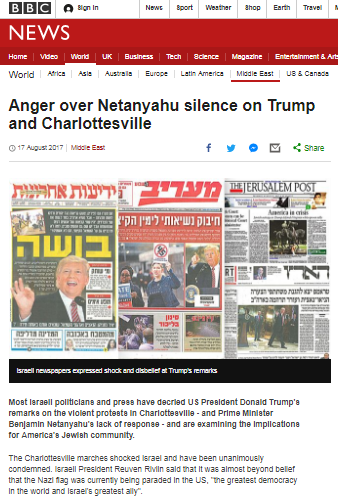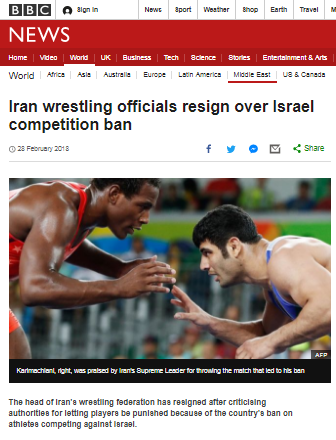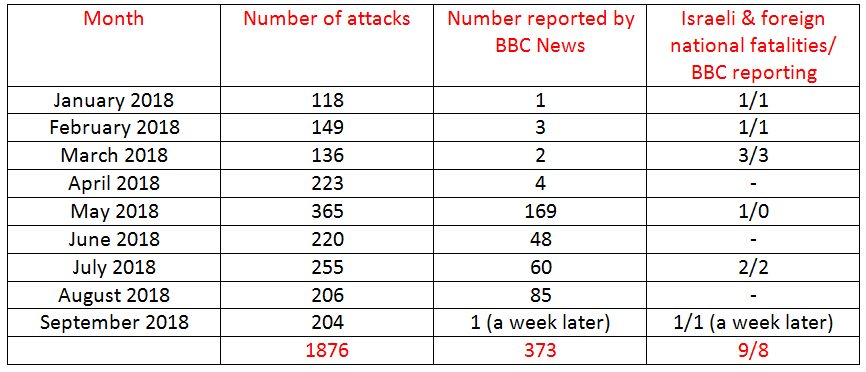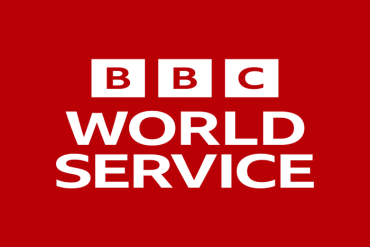As noted here earlier, on the afternoon of August 16th the BBC World Service inaccurately told its listeners that:
“While President Trump has come under a lot of flack from Jewish leaders and politicians in the US for his perceived hesitancy in condemning the groups, in Israel Prime Minister Netanyahu and most politicians have been rather more muted regarding what the president said.”
The next day, however, the BBC suddenly changed its tune. An article published in the ‘features’ section of the BBC News website’s Middle East page on the evening of August 17th under the headline “Anger over Netanyahu silence on Trump and Charlottesville” told readers that:
“Most Israeli politicians and press have decried US President Donald Trump’s remarks on the violent protests in Charlottesville – and Prime Minister Benjamin Netanyahu’s lack of response – and are examining the implications for America’s Jewish community.” [emphasis added]
The article’s next four paragraphs detailed condemnation of the neo-Nazi march in Charlottesville from Israel’s president and some Israeli newspapers – informing readers that while Yediot Aharonot, Ma’ariv and the “liberal daily” Ha’aretz slammed remarks made by the US president on their front pages:
“Newspaper Israel Hayom, reputed to be close to Prime Minister Benjamin Netanyahu, made no mention of the developments on its front page and offered factual coverage on page 24.”
Readers were also told that:
“Labour Party member of the Knesset Shelly Yachimovich took to Facebook to say that as the daughter of Holocaust survivors, she found the display of Nazi symbols “physically nauseating”.
She also took aim at Prime Minister Netanyahu who condemned the far-right protestors but not Trump’s words: “You, the prime minister of the Jewish people in their land, the man who warns us about a Holocaust every Monday and Thursday with fear mongering and bombastic oaths of ” never again”? What is the matter with you?””
The next seven paragraphs were devoted to portrayal of social media posts from Netanyahu and his son and the reactions of various politicians and a Ha’aretz columnist. The article’s last six paragraphs were devoted to another story in which the Israeli prime minister was criticised by various Ha’aretz writers.
This BBC article is credited to BBC Monitoring: the department that tracks and translates open source media around the world for the BBC as well as commercial clients. In 2015 its then newly appointed head said:
“Our ability to follow the world’s ever expanding traditional and digital media sources is unique and brings crucial insights to the BBC’s journalism as we seek to inform and explain incredibly complex stories of global impact.”
The BBC is certainly not the only media outlet to have devoted column space to amplification of criticism of the Israeli prime minister’s response to the incidents in Charlottesville from rival politicians, politically partisan journalists and self-appointed pundits.
However, seeing as the information in this article is readily available to the general public in the online English language Israeli press (including the sources of the multiple promoted quotes from Ha’aretz), one can only wonder why BBC Monitoring spent time and resources on promoting a story that needed no translation, is not an “incredibly complex” issue “of global impact” and certainly does not provide “crucial insights” into anything – apart from how journalists quoting and amplifying other journalists manufacture media ‘buzz’.
Related Articles:
Is a BBC WS claim about Israeli politicians true?
Guardian columnist compares white supremacism with ‘right-wing’ Zionism (UK Media Watch)




